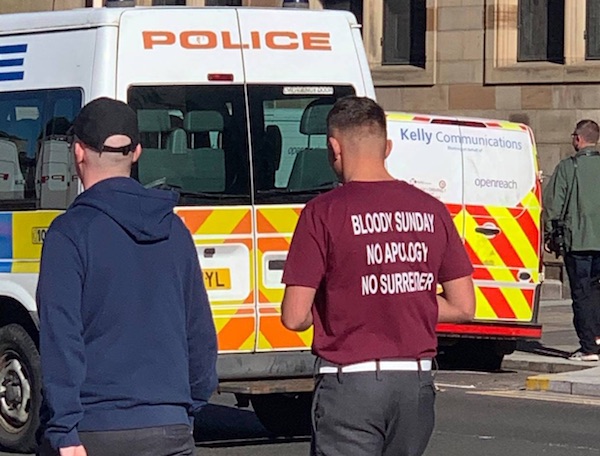
Four loyalist parades went ahead in Scotland last weekend after a ban was dropped in fear that loyalist marchers would react violently if they were not allowed to proceed.
Glasgow City Council claimed it had been put in an “impossible position” after police there warned there could be “serious disorder” if the ‘Pride of Govan’ parade involving hundreds of marchers did not go ahead.
The sharp u-turn was blamed on loyalist violence and disturbances during marches on August 30 and September 7.
A full-scale riot broke out in the Elder Park area of Govan after an Irish Unity march was set upon by hundreds of orchestrated loyalists. Riot police, mounted officers, a police helicopter and dog units were involved. A similar scenario played out the following weekend.
A council spokesman said: “The council has been placed in an impossible position in relation to the parade in Govan.
“Police Scotland has said that should the procession not go ahead, many of the 800 people due to take part will react angrily - which could lead to violence and a significant impact on the local community.
“We deeply regret that the wider community in Govan will be subject to this disruption. However, police have made it absolutely clear that this could be made worse if these people are not allowed to march.”
While the marches took place last weekend without serious incident, some Govan marchers wore Bloody Sunday “no apology, no surrender” in support of British soldiers who murdered fourteen innocent Irish nationalist civil rights protestors in 1972.
According to one of Scotland’s most eminent historians, Professor Tom Devine, violence by loyalists in the past few weeks at republican marches in Glasgow is linked to Brexit.
Speaking to the National newspaper, he said that violent disorder was as a result of organised activity, with militant loyalists reacting after issues of Anglo-Scottish Union and Irish unification were “put on the table” by Brexit.
Devine, a professor at Edinburgh University, said militant Protestant groups had been “the aggressors” in recent disturbances.
“They are stout defenders of the Anglo-Scottish Union and passionate opponents of Irish unification. Both issues are firmly back on the political agenda to a large extent because of Brexit,” he said.
“Militant Unionists are fearful and insecure as a result and this has fed their violent interventions against Republican parades, most of which had passed off peacefully for many years in the past.”
![[Irish Republican News]](https://republican-news.org/graphics/title_gifs/rn.gif)
![[Irish Republican News]](https://republican-news.org/graphics/title_gifs/harp.gif)

